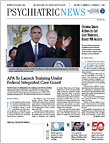When and how often should I check voicemail? How should I handle a gift from a patient? How can I use supervision to help me improve my skills? Do I have to and should I get my own therapy? How can I get involved in research, if I’m not already published? I’m still learning myself—how can I teach a medical student? What are the most important journals in our field? What are the best books to prepare for PRITE and the boards? These (and many more) questions all residents face are addressed in A Resident’s Guide to Surviving Psychiatric Training, Third Edition, a publication for APA’s resident and fellow members written by psychiatry residents, fellows, and attending physicians and designed to help you navigate these challenges.
As I look back on the last three and a half years of my psychiatry residency, I truly believe my experience has been an incredible journey of both personal and professional development. Given the adaptive function of forgetting, it would be easy to gloss over the challenges, but it is also important to remember them. I recall feeling physically and emotionally exhausted working nights and weekends, feeling criticized when others told me that psychiatry is not “really” medicine or science, and questioning our field’s ability to help people when working with the most severe and recalcitrant patients. During these times, psychiatry residency can be very isolating, and it is easy to lose sight of the plain and simple fact that our predecessors before us have survived and even thrived in the face of many of these challenges. We do not have to figure out everything on our own, but we do have to find our own personal narrative of how we fit into our field.
To help bridge this gap and navigate the sometimes rough terrain of a psychiatry residency, residents from across the country originally convened in 1999 through the Group for the Advancement of Psychiatry to write the Resident’s Guide. It was created to provide practical skills, tips, and tricks for managing common and difficult aspects of our training. The Resident’s Guide is the culmination of years of experiences of residents, fellows, early career psychiatrists, and experts in the field. It was recently updated by the APA Leadership Fellows and APA SAMHSA Substance Abuse Fellows to reflect even more timely topics like social media, business skills, resident and patient suicide, and cultural challenges in psychiatry.
This handbook is meant to be a reference guide across the four years of psychiatry residency, and I think you will find it useful in new ways as you develop and progress. The Resident’s Guide is not a clinical textbook for the student learning psychiatry, but rather a resource for the person becoming a psychiatrist.
Finally, to add my own practical tip, I strongly encourage you to print out the guide and keep a copy for yourself. You might also encourage new interns to access the guide as well when they begin their training. I hope you and your colleagues will find this collection of experiences and advice useful as you create your own path to becoming a psychiatrist. Happy reading! ■
The guide can be accessed on APA’s
website.

